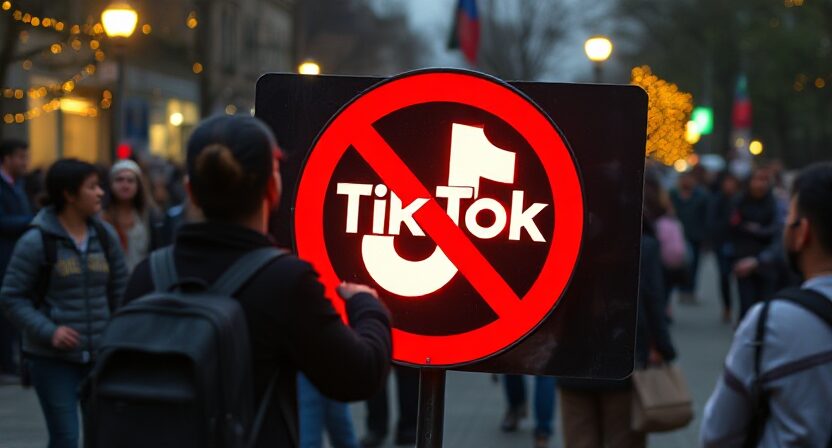TikTok Bans in USA: Everything You Need to Know
TikTok, a global phenomenon that has redefined social media, has faced its share of controversies over the years. From its meteoric rise in popularity to debates surrounding its data practices, the platform has sparked discussions across the globe. In recent years, the topic of TikTok bans has gained significant attention, especially in countries like the United States, India, and beyond. But why is TikTok being banned, where is it restricted, and what does the future hold for this platform? Let’s dive into the details.
What Is TikTok, and Why Has It Been Targeted?

As we know TikTok, owned by the Chinese company ByteDance, is a social media platform that allows users to create and share short videos. Its algorithm, which curates personalized content, has been widely praised for its ability to keep users engaged. However, its Chinese ownership has raised concerns about data privacy, censorship, and national security.
Key Reasons Behind TikTok Bans in US
- Data Privacy Concerns
Critics argue that TikTok collects vast amounts of user data, including location information, device details, and user behavior. Some governments fear that this data could be shared with the Chinese government, raising concerns about surveillance and misuse. - National Security Threats
In countries like the United States, officials have expressed concerns that TikTok could be used as a tool for espionage or propaganda, given its ties to China. - Content Moderation and Misinformation
TikTok has faced criticism for hosting harmful content, promoting misinformation, and failing to adequately moderate inappropriate material. - Cultural and Political Tensions
In some regions, TikTok has been accused of promoting content that contradicts local cultural or political norms. This has led to calls for its restriction or outright ban.
A Timeline of TikTok Bans
India: The First Major Ban
In June 2020, India banned TikTok along with several other Chinese apps, citing national security concerns. This move followed rising tensions between India and China and resulted in the platform losing one of its largest user bases.
United States: A Legal Tug-of-War
The U.S. has had a rocky relationship with TikTok.
- 2020 (Trump Administration): Former President Donald Trump sought to ban TikTok unless it was sold to a U.S.-based company. This led to a potential deal involving Oracle and Walmart, but the ban was never fully implemented due to legal challenges.
- 2023–2025 (Biden Administration): While initially less aggressive, the Biden administration has increased scrutiny on TikTok, proposing legislation to restrict its operations unless ByteDance divests its ownership.
Other Countries
- Pakistan: TikTok has been temporarily banned multiple times over allegations of hosting immoral or indecent content.
- Afghanistan: The Taliban government banned TikTok, citing its “misleading content.”
- Europe: While TikTok hasn’t faced outright bans, it is under investigation for data privacy violations and potential security risks.
Can TikTok Be Used After a Ban?
When TikTok is banned in a region, access is typically restricted through app stores and ISPs (Internet Service Providers). However, many users turn to Virtual Private Networks (VPNs) to bypass these restrictions.
How to Use TikTok After a Ban
- VPNs: A VPN can mask your location and allow you to access TikTok as if you were in a country where it’s available. Popular options include NordVPN and ExpressVPN.
- Alternative Platforms: Apps like Instagram Reels, YouTube Shorts, and Byte offer similar short-form video experiences.
Note: Using a VPN to bypass restrictions may violate local laws, so proceed with caution.
TikTok Alternatives
For those affected by the ban, several alternatives provide similar experiences:
- Instagram Reels: Integrated into the Instagram app, Reels has gained significant traction as a TikTok competitor.
- YouTube Shorts: YouTube’s short-form video feature offers a vast audience base and monetization opportunities.
- Snapchat Spotlight: A lesser-known feature but one that promotes short, engaging videos.
- Triller and Dubsmash: These apps were popularized as TikTok competitors, particularly in regions where TikTok faced bans.
Will TikTok Come Back?
The return of TikTok in banned regions depends on negotiations between governments and ByteDance. For example, there has been ongoing debate in the U.S. about allowing TikTok to continue operating under certain conditions, such as selling its American operations to a non-Chinese entity.
How Does TikTok Respond?
TikTok has consistently denied allegations of wrongdoing. The company claims it stores user data outside China (e.g., in the U.S. and Singapore) and has implemented measures to ensure transparency and compliance with local laws.
Additionally, TikTok has launched PR campaigns and introduced new features to address content moderation and data privacy concerns.
What’s Next for TikTok?
As of 2025, the future of TikTok remains uncertain. Governments worldwide are considering tighter regulations on apps that collect user data, particularly those with ties to foreign entities.
Potential Scenarios
- Increased Regulations: TikTok may need to comply with stricter laws to operate in certain regions.
- Divestment: ByteDance might sell its TikTok operations in key markets to address security concerns.
- Emergence of Competitors: If TikTok’s availability continues to be limited, other platforms may fill the void.
Conclusion
TikTok’s journey reflects the broader challenges of balancing innovation, security, and globalization in the digital age. While its future in certain regions remains uncertain, the app’s impact on social media and content creation is undeniable.
For users, the debate over TikTok highlights the importance of understanding data privacy and exploring alternative platforms. As the story of TikTok unfolds, one thing is clear: it has changed the way we connect, create, and consume content, and its legacy will endure regardless of the outcome.
Have insights or updates about TikTok’s ban? Share your thoughts in the comments below!
Is TikTok banned in the U.S. in 2025?
As of 2025, TikTok faces restrictions and legal scrutiny in the U.S., but a nationwide ban has not yet been fully implemented.
Can I still use TikTok after it’s banned?
Yes, you can use TikTok after a ban by using a VPN to bypass restrictions, but this may violate local laws.
What are some TikTok alternatives?
Popular alternatives include Instagram Reels, YouTube Shorts, Snapchat Spotlight, and apps like Triller and Byte.
Is TikTok banned in China?
TikTok is not banned in China but operates as a different version called Douyin, tailored to Chinese regulations.
Will TikTok come back in banned regions?
Governments fear that TikTok could share user data with the Chinese government, potentially compromising sensitive information.
Can I use a VPN for TikTok?
Yes, VPNs like NordVPN and ExpressVPN allow access to TikTok in restricted regions. However, this may breach local regulations.






